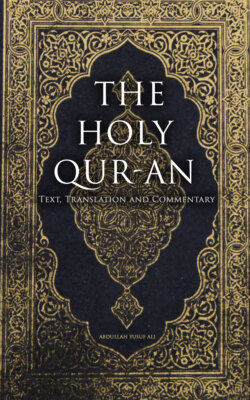Читать книгу The Holy Qur-an: Text, Translation and Commentary - Abdullah Yusuf Ali - Страница 7
На сайте Литреса книга снята с продажи.
Transliteration Of Arabic Words And Names
ОглавлениеTable of Contents
The following table shows the system which I have followed in transliterating the letters of the Arabic alphabet :—
ا Consonantal sound a
ء Consonantal sound a
ا Long vowel * ā
ب …………………… b
ت …………………… t
ث …………………… ṯẖ
ج …………………… j
ح …………………… ḥ
خ …………………… ḵẖ
د …………………… d
ذ …………………… ẓ
ر …………………… r
ز …………………… z
س …………………… s
ش …………………… sh
ص …………………… ṣ
ض …………………… ḏẖ
ط …………………… ṭ
ظ …………………… ẕ
ع …………………… ‘ (inverted apostrophe)
غ …………………… ḡ
ف …………………… f
ق …………………… q
ك …………………… k
ل …………………… l
م …………………… m
ن …………………… n
هـ ه …………………… h
و consonant w
و long vowel* ū
و diphthong au
ي consonant y
ي long vowel* ī
ي diphthong ai
Short vowels:
َ– (fatḥa) a ِ– (kasra) i ُ– (ḏẖamma) u
1. For the hamzā (ء) I have used no distinctive sign. An apostrophe for it and an inverted apostrophe for the ‘ain (ع), or vice versa, is confusing to English readers. As a moved consonant, it is sufficiently shown in English by the long or short vowel which moves it, e.g., ab, Raūf. Where it is a hiatus preceded by a fatḥa, I have shown it by a second a: thus, Iqraa, the cave of Hiraa. In other cases it has not been possible to show it without using a distinctive sign. The name of the Holy Book is usually written Qurān ; but I prefer to write Qur-ān.
2. The final h preceded by the short a is scarcely pronounced, and I have left it out. Hence Sūra, Fātiḥa, Hijra, etc., where the Arabic spelling would require Sūrah, Fātihah, Hijrah, etc.
3. In internationalised words and names I have used the spelling ordinarily current in English ; e.g., Mecca, Medina, Maulvi, Urdu, Islam, Israel, Abraham, Jacob. Here the boundary is thin and rather ill-defined, and possibly my practice and that of my proof-readers have not been absolutely uniform.
4. Some names, e.g., Ishmael, Hagar, etc., have acquired a contemptuous association in their European forms, while the persons they represent are sacred personages held in great honour in Islam. I have, therefore, avoided the European forms and used the Arabic forms, Ismā’īl, Hājar, etc.
Where it is really pronounced long. Hence ḵẖalaqnā-kum but ḵẖalaqnal-insān ; Abū Sufyān but Abul-Qāsim ; fin-nār but fī-hi.
